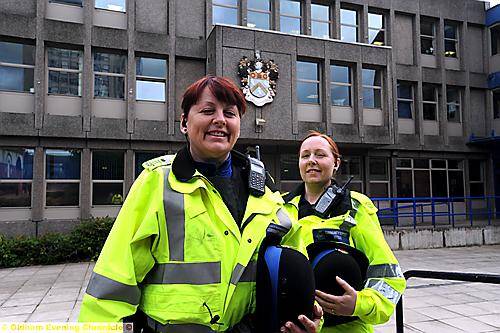We’ve got the PCSO power
Reporter: LEWIS JONES
Date published: 30 May 2011

ENHANCED role . . . PCSO Sharon Quigley (left) and new recruit Louise Leach at Oldham Police Station
OLDHAM is leading the way after giving Police Community Support Officers more powers to crack crime.
Labelled “plastic bobbies” by critics in the past, PCSOs in Oldham have stepped up to the plate after being given enhanced roles during a six-week pilot study.
Such was the success that the new roles will be implemented across Greater Manchester Police’s 853 support officers — and the rest of the country could follow.
A total of 16 of Oldham’s 79 PCSOs tested new ways of working in which they could follow up investigations, play a part in crime scene management and be deployed to selected crimes.
Chief Superintendent Tim Forber said: “I’ve worked in three police forces since the introduction of PCSOs and in all forces I have seen fantastically dedicated people, committed to making a difference. They are a vital part of serving the community.
“Crime is down by 41 per cent from 10 years ago and that’s a significant achievement. We want to be at the forefront of innovation to continue to reduce crime.”
The pilot was part of a project to improve the way in which Neighbourhood Policing Teams worked.
It found that the PCSOs who took part increased the number of crimes recorded from two in December to 24 in February and March.
The number of incidents dealt with also rocketed from 39 in December to 115 in March.
It also found that it enabled more targeted and efficient deployment of PCSOs as well as allowing them to be involved in taking witness accounts and creating crime scene logs. Another result was that it released time for police officers to deal with other incidents. Among those celebrating the news was Sharon Quigley, who took part in the trial, and one of the borough’s newest PCSOs, Louise Leach, who will now receive extra training as part of the scheme.
Policing Model Implementation Team Police Sergeant John-Paul Ruffle said: “The modernisation of their role enables them to support secondary investigations, attend crimes with negative lines of inquiry and manage crime scenes where there are no associated risks.
“The outcome of the pilot was that victims received a quicker service, PCSOs were able to report more crimes while still being visible in the community and release police officers back to frontline duties that require the additional powers granted to police officers.
“Following this success, GMP is now commencing a programme of training for all PCSOs across the force.”
Most Viewed News Stories
- 1The Oldhamers handed awards in King’s New Year’s Honours List
- 2You can score free tickets to a Latics game while supporting Dr Kershaw’s Hospice
- 3Primary school in Uppermill considers introducing new ‘faith-based’ entry criteria to tackle...
- 4Public inquiry announced into rail upgrade that could leave villages ‘cut off’ for months
- 5Tributes paid following death of hugely respected Oldham community figure Dale Harris




